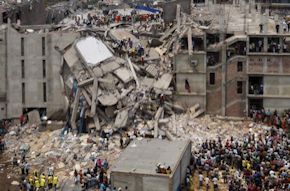|
Sustainability is Driving Consumers' Purchase Decisions
It's All About Your Actions & Reputation
 The
meteoric rise of fast-fashion has brought with it a serious philosophical
for consumers: should they consider mass produced goods' impact on labor
practices and the environment? The
meteoric rise of fast-fashion has brought with it a serious philosophical
for consumers: should they consider mass produced goods' impact on labor
practices and the environment?
Shoppers are increasingly considering sustainability when making purchases,
according to research conducted by CGS in November 2018, which found that 68% of
US internet users deemed product sustainability an important factor in making a
purchase.
Some retailers are paying attention to consumer demands for a better
understanding of issues that once were likely ignored, such as ethical supply
chains. For example, the fashion retailer Everlane has incorporated a policy of
"radical transparency" into its brand identity by sharing the details of
product markups, sourcing practices and manufacturing facilities with
shoppers.
GS's survey revealed that younger shoppers seemed more attuned to the ecological
impact of their purchases. The poll found that 68% of those ages 18 to 24
had made an eco-friendly purchase sometime during the preceding year and were
willing to pay higher prices for sustainable products when compared with the
general public.
CGS claims that transparency around the materials and development of products
can increase consumer loyalty. "Today's buyers are driven by more than
price—they're looking for brands that align with their own values and needs,"
said Paul Magel, president of CGS' business applications division.
retail.emarketer.com
Editor's Note: The Growing Importance of Sustainability & LP's Role Long Term
The Triggers That Brought Us Here - Fast Fashion Played a Role
When looking over just the last few years and seeing the impact of the
Bangladesh garment factory fire that killed 112 workers in 2012, the
2013 Bangladesh Rana Plaza - garment building collapse that killed 1,100
workers, the 37 call center agents working for U.S. owned Research Now Survey
Sampling International (SSI), that's even worked with the NRF in the past on
surveys, killed in the
NCCC Davao shopping mall fire in the Philippines the Saturday before
Christmas 2017.


All of which have led to
dozens of criminal and murder charges, a
Walmart led Environmental Health and Safety academy in Bangladesh and
more than 200
apparel companies from 20 countries signing a five year -
Accord on Fire and
Building Safety in Bangladesh to prevent similar tragedies from happening.

So,
what does that catastrophe have to do with consumers in the US? A number of
Western companies, from Nike to Ivanka Trump to H&M, source labor from
Bangladesh. Specifically, Zara, Walmart, Benetton, and Mango had all
produced apparel in Rana Plaza factories. And more than
120,000 pounds of clothing from The Children’s Place had been produced at
the plaza during the eight months before the building fell.
As a result of the accord, 97,000 of 132,000 hazards at factories in
Bangladesh have been eliminated. An additional 12,000 hazards have
reportedly been addressed.
Since the fall of Rana Plaza,
garment worker deaths haven’t been completely eliminated, according to
the ILRF, but they have dropped precipitously. Roughly 40
Bangladeshi garment workers have died, mostly in fires, since the disaster.
Compare this to the 2006-2010 period, when nearly 500 garment workers were
killed in fires and similar circumstances in Bangladesh.
racked.com
The Government of Bangladesh has said that the Accord will not be extended at
the end of its five-year term.[10]
wikipedia.org
The Intersection Between Sustainability and
Loss Prevention
|






